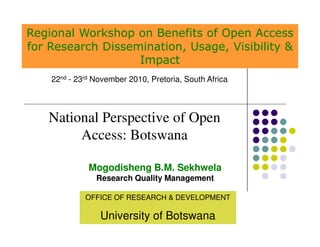National Perspective of Open Access: Botswana
- 1. Regional Workshop on Benefits of Open Access for Research Dissemination, Usage, Visibility & Impact 22nd - 23rd November 2010, Pretoria, South Africa National Perspective of Open Access: Botswana Mogodisheng B.M. Sekhwela Research Quality Management OFFICE OF RESEARCH & DEVELOPMENT University of Botswana
- 2. Recognitions Grateful to have been invited Sponsors: Academy of Science of South Africa (ASSAF) Eifl UNESCO University of Botswana for the permission and support Hopefully more enlightenment on how best to speed up open access by end of workshop
- 3. Open Access in Botswana: Historical Context Botswana gained independence in 1966 Anthropological Research Act enacted 1967 Govern the pursuit of research, but prompted by the ŌĆśover-researchingŌĆÖ of the San in Kalahari Monitor research, in particular on the San Obligation of researcher to deposit research results & findings at designated repositories: National Library, National Archives and University of Botswana Library - Support Open Readership Research Permit REQUIRED for research.
- 4. Historical Context Cont.: Researchers mainly from outside Botswana Research Participation Trends 200 Figure 1 180 Permits Approved 160 140 120 100 Locals 80 Expatriates 60 40 20 0 1966-76 1977-79 1983 1984-1987 Period
- 5. Dissemination: Whose Knowledge? E.g. University of Botswana Research Outputs Figure 2 1995-03 Books 1000 800 In_Prep 600 Chapters 400 200 0 Dissertation Journal Articles Other_Publication Conf_Papers
- 6. Office of Research and Development Institutional Control of Outputs Peer reviews Research Proposal Revision/ Review Process No Quality Improvement and Management Quality Improvement and Management Improvement (suggestions) Yes Figure 3 Funding No Yes (suggestions) Ethics Reviews ORD Funds Faculty Office of Research (ORD) Office of Research (ORD) Outside ORD Research Teaching & Publishers Control Progress Training Publishers Administrative Reports UB Control Peer Reviews Research Output Research Report Publication Development/Client Outputs s Database Commercialization Source: Sekhwela, 2006, SARIMA
- 7. Dissemination: Whose Content? Quality in Research = High Quality Publication UB: 2004-07 Figure 4 Book 1000 Other 800 Book Chapter Publications 600 400 200 0 Refereed Paper Non Refereed in Conference Journal Non Refereed Refereed Journal Papers inŌĆ”
- 8. Research to Inform Nationally & Globally (Botswana) National Developments: Food and Energy Production Systems Sustainable Development Paths Etc. Aspirations: VISION 2016 Informed and Innovative Nation Wealthy and Healthy Nation ŌĆō HIV/AIDS fight Global Climatic & Environmental Changes - DROUGHTS Etc. ALL EYES ON UNIVERSITY RESEARCH!!
- 9. Research in ŌĆśPublic FocusŌĆÖ Knowledge is critical for sustainable development in the competitive global economy (Ramphele, 2004) Application of knowledge to inform practice and policy is growing, confidence in quality of research and information generated (Boaz, ud). Knowledge is ŌĆśpublic goodŌĆÖ that every research is expected to contribute Research is about knowledge generation, and increasing mandatory dissemination of publicly funded research Sekhwela (SARIMA, 2006)
- 10. Initiatives for Research & Innovation Draft Botswana Science and Technology Policy 1998 Public and private sector partnership initiatives Botswana National Research Science & Technology Plan (2005) ŌĆō Competitive research suppliers New Botswana International University of Science and Technology (BIUST) approved Botswana Innovation Hub (BIH) (2006)ŌĆō UB regarded as a partner New Tertiary Education Policy (2008) ŌĆō Knowledge & Innovation for national development
- 11. Research Drive & Accountability Need to access existing body of knowledge High cost to access current knowledge. Realisation that knowledge is generated by researchers, but transferred to Publishers Knowledge becomes ŌĆśCONTENTŌĆÖ controlled by content creators Quality of research is assured by researchers through peer review processes ŌĆśfreeŌĆÖ to content creators? Further knowledge generation constrained by content creatorsŌĆÖ high pricing to access! Knowledge generators push for cheaper access
- 12. Open Access: Whose Content? Grey literature: Unpublished reports - Repositories White literature: Published research ŌĆō owned by publishers. Quality assured Reputable knowledge Highly valued Various format/media Cost involved What does Open Access mean then?
- 13. Situation in Botswana Open Access still just the obligatory reposition of research reports UB lead institution like other Universities worldwide that are pushing for Open Access to its own research publications Recently held national awareness raising workshop on Open Access However, UB still to develop clear Open Access policy Institutional Repository policy ŌĆō Open Access mentioned. Policy implementation ongoing: University of Botswana Research, Innovation & Scholarship Archive (UBRISA)
- 14. UB: Research Publications Availability Institutional Repository Archive Access to information International VISIBILTY and Impact Marketing Capabality Capacity Etc. University of Botswna Research, Innovation & Scholarship Archive (UBRISA) (http://ubrisa.ub.bw)
- 15. UBRISA Impact UB visibility Access to UB research outputs Statistics on use/access (hits) of UB research outputs Source of UB research for official purposes Collections/communities to attract more collaborations and partnerships Outputs from ongoing research work ETC
- 16. RMS & UBRISA Online Systems Research Information Funding data Research Data Analysis Research Information access University research outputs stored and accessible Researcher outputs monitoring University research visibility enhanced Overall research output in pursuit of institutional goals ŌĆō eg. Excellence tracked!
- 17. Own UB Content: Journals, etc. Figure 5
- 18. Other Strategic Links: PMS UB Vision: Strategy For Excellence Figure 6 University Research Strategy Research Management UBRISA System PMS Source: Sekhwela, 2009
- 19. End
- 20. THANK YOU




















